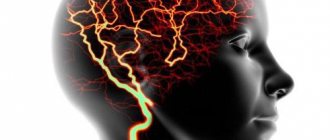Bladder neurosis can manifest itself in the form of two differently directed symptoms.
- The first - the most common - is psychogenic urinary retention (paruresis). A person with symptoms of paruresis finds it difficult or impossible to urinate in the presence of other people. This is a fairly common problem, often first appearing at school.
- The second symptom is a constantly felt urge to go to the toilet, intensified as a result of nervous tension, as well as frequent urination. This manifestation of neurosis is often called nervous (neurogenic) bladder syndrome, although this is not an entirely correct name.
Both forms of neurosis are accompanied by various variations of fears of public shame. They are quite common types of social phobia, ranking second after fear of public speaking.
Kinds
There are two types of neurosis, each of which is equally common:
- paruresis;
- neurogenic bladder syndrome.
The first is the classic type of syndrome: a person cannot empty his bladder if other people are nearby. According to statistics, the vast majority of people suffer from paruresis, and the origins of this phenomenon can be sought back in a person’s school days. Over time, when the anxiety disorder takes hold, a person, entering a toilet stall, cannot calm down for a long time in order to relax his muscles and defecate. In extreme cases, bladder neurosis torments a person even at home, within the walls of his own bathroom.
Bladder neurosis of the second type is called “neurogenic,” although it would be correct to call it “nervous.” With this type of pathology, a person experiences the urge to urinate in any stressful situation, during a conflict, or in public speaking.
In stressful situations, the urge to urinate begins
Both of these types are united by one large and widespread neurosis - a pathological fear of public shame. It is important to understand that problems with urination are only the tip of a person’s fears and anxieties. Therefore, when trying to get rid of a problem, it is necessary to look for its root, which, most often, lies in social phobia.
Causes
Impaired urination is often associated with various diseases, such as prostatitis, which leads to stagnation of urine.
A spinal cord injury can cause the disease, since in close proximity to it there are the autonomic ganglia of the pelvic organs, where a large number of nerves, including those from the bladder, intersect.
In addition, the appearance of the disease can be caused by a variety of somatic diseases - diabetes or sclerosis.
For this reason, the attending physician first prescribes an additional examination to make sure that there are no problems with the urinary system and that there are no physiological obstacles to urination.
The bladder includes 2 sphincters, which perform the functions of relaxation and contraction, due to which urine flows out.
Negative factors such as depression, stress, worries, as well as negative emotions - worry, anxiety, severe fear, shame, provoke overexcitation of any part of the nervous system, which leads to disruption of the sphincters and pathological urinary retention.
The development of this pathological condition can also be provoked by the abuse of alcoholic beverages and an irregular daily routine.
Pathogenesis
Our body is controlled by the nervous system, or more precisely, by two of its divisions – the sympathetic and the parasympathetic.
The sympathetic department is responsible for mobilizing the body in case of danger. When it is activated, the muscular system tenses, the heartbeat quickens, the pupil dilates, and the person is ready to run away from danger or attack an enemy.
It is important to remember that the nervous system was formed millions of years ago, when the skills of running away and attacking were more effective than negotiating and persuading, as they are now. But our psyche continues to live according to the laws of the past, ignoring civilization and the cultural aspect.
The parasympathetic department responds to relaxation and accumulation of strength. The human muscles are relaxed, the digestive tract is ready to digest food. These two departments are never included in work together, they alternate each other, providing a regime of activity and rest for a comfortable and productive life.
With neurosis, the activity of these two parts of the autonomic nervous system is disrupted; they can arbitrarily replace each other without any reason, which can be observed during a classic panic attack.
With bladder neurosis, a conflict between the sympathetic and parasympathetic divisions also occurs. The parasympathetic system gives the go-ahead for urination, and the brain sends a signal to the muscles and bladder sphincter to relax. But the sympathetic system instantly intervened in the process and orders all muscles to tense and the urination process to stop.
If you have a strong desire to empty your bladder, you cannot do so.
Thus, a person experiences a strong desire to empty the bladder, but physically cannot do it.
Worth seeing: Noogenic neurosis
Symptoms
Symptoms of bladder neurosis are not limited to the phenomenon when the urge to empty does not result in immediate emptying.
If we are really talking about neurosis, and not about an inflammatory process or injury, the pathology has a number of signs, while paruresis and neurogenic bladder syndrome have different symptoms.
Signs of paruresis include:
- feeling of fear at the thought of going to the restroom outside the home;
- inability to go to the toilet even at home if there are strangers visiting;
- avoiding public toilets or bathrooms in the homes of friends and acquaintances;
- panic fear that someone might hear the noise made when urinating or smell it;
- the need for lengthy “self-tuning” in the toilet before emptying.
In cases of advanced neurosis, a person begins to become more sophisticated in trying to get rid of the need to visit the toilet in front of strangers: he tries to drink less fluids or leave the house less if he lives alone.
In the toilet you have to spend a long time adjusting before you have a bowel movement.
Neurogenic bladder syndrome is a neurosis in which a person “does not trust” his bladder and is afraid that it will let him down and disgrace him at the most unexpected moment. Like a neurotic with paruresis, he maintains strict control over his diuresis. And if she plans to leave the house, she sharply reduces the amount of liquid she drinks and tries to go to the toilet at home, even in the absence of the urge. In addition, symptoms of neurogenic bladder include:
- drawing up in your head a detailed map of the “toilets” where you can go on any route, while the person wants to find out the location of the “toilets” himself, without asking people questions personally;
- a constant feeling of internal anxiety, drawing pictures in his head of how he will not be able to restrain the urge and will have a bowel movement right in front of everyone;
- frequent urination during neurosis with minimal portions of urine;
- use of adult diapers for prevention.
Of course, life with such symptoms becomes unbearable. All a person’s plans are put into practice only after a resolution is made by bladder neurosis. And, if a person is offered an interesting, profitable and fun business that will jeopardize the sensitivity of the process of urination, the person will most likely refuse. And if he agrees, he will not receive any pleasure from the event - all his thoughts will revolve around, no matter how it sounds, the bladder. In the language of psychology, this is called a dominant.
Neurogenic bladder in a child
Bladder problems occur at any age in both children and adults. They cause a lot of trouble because you have to constantly go to the toilet.
This is especially unpleasant if a person does not have the opportunity to constantly visit the restroom. In children, this problem can cause complexes and mental disorders.
Finding out why this happens is sometimes not so easy, because frequent urination is observed not only due to physiological reasons, but also due to neurosis.
Features of the pathological process
Initially, the specialist will need to find out whether there are any physiological reasons causing difficulty in urinating. Indeed, due to various pathological processes and kidney problems, a person may experience stagnation of urine. To treat, you will have to eliminate the factor that caused the problem and take diuretics (diuretics).
Bladder problems occur at any age in both children and adults. They cause a lot of trouble because you have to constantly go to the toilet.
This is especially unpleasant if a person does not have the opportunity to constantly visit the restroom. In children, this problem can cause complexes and mental disorders.
Finding out why this happens is sometimes not so easy, because frequent urination is observed not only due to physiological reasons, but also due to neurosis.
Bladder neurosis occurs in 10% of children. In young children, the symptoms are easy to identify - frequent urination, including incontinence and unbearable pain, but urinary retention is also possible.
In the mild stage, most children are simply unable to hold the contents of the bladder when it is full for a long time. If the spinal cord is affected at the level of the conus and its roots, they speak of true incontinence, when urine entering the bladder cavity is released drop by drop continuously.
In children, this is caused by atony of the muscles of this organ. With complete muscle atony, part of the urine is retained in the bladder cavity, causing cystitis.
Treatment
Many people mistakenly believe that since neurosis is not a disease, but a psychological problem, then it cannot be treated, you can only adapt to sad circumstances and “carry your cross.” But this position is fundamentally wrong, because organ neuroses are perfectly treatable. True, today the term “organ neurosis” has been replaced by the concept of psychosomatics, and a psychotherapist is involved in its treatment.
Treatment of bladder neurosis begins with the realization that the problem really exists, life with it is far from normal, but there are a huge number of people with the same problem, including those who were able to cope with neurosis and begin to live a full life.
Worth seeing: Neurosis of the Heart
The psychotherapist will try to help find what is the true cause of fear. This is not necessary in order to find the culprit, for example, that neighbors in the country were “watching” at the door of the toilet and laughing. But a sober look at the situation, that such a tiny episode could entail such global consequences, can help a person take the first step towards deliverance.
It is advisable to consult a doctor for treatment
But neuroses, unfortunately, are not treated through theoretical reasoning in the therapist’s soft chair. It is necessary in practice to replace the pathological pattern with a normal one. To do this, you need to overcome the problem gradually, without causing severe stress.
Therapy for paruresis
If a person has paruresis type neurosis, he can ask a loved one to stand outside the toilet door while emptying the bladder. Let him first stand outside the door for a couple of seconds, then longer, and in the end he will accompany you as an hour-long trip to the toilet from beginning to end. After this, you can make a “foray” into a public toilet and continue to use other people’s toilets until the problem goes away.
Therapy for neurogenic bladder
In this case, a person needs to learn to cope with his own nervous system, apply existing relaxation methods or come up with his own. There are methods that have been successfully used for many years: a person immerses himself in the “here and now” environment, observes his surroundings, and relaxes the body. After the nervous system has stabilized, a person will be able to clearly understand his feelings: whether he wants to go to the toilet or not.
Diagnostics
Having established characteristic symptoms, a diagnosis should be made by examining:
- urodynamics, due to which the specificity and level of organ dysfunction are determined;
- ultrasonography, urography, which allows you to detect organic changes.
Diagnosis and, preferably, treatment for both children and adults are prescribed jointly by a urologist and a neurologist. To diagnose a neurogenic bladder, instrumental, radionuclide and x-ray examination methods are used.
When working with children, they initially determine how frequent their urination is: all cases of urine leakage over several days are taken into account. If a child goes to the toilet more than 8 times a day, then the bladder is hyper-reflexive, if 2-3 times, then it is hypo-reflexive.
Diagnosis is based on the results of a thorough clinical examination. During the examination, special attention is paid to the following factors:
- previous surgical interventions in the field of gynecology;
- the patient’s sexual relations (does the person experience orgasm, is there pain during sexual intercourse);
- taking contraceptive medications;
- check reproductive function and menstrual cycle.
As a rule, the diagnosis of cystalgia is made by excluding other diseases in the bladder and urethra. To do this, the genital organs are examined, laboratory tests of urinary fluid, and X-ray and radiological methods are prescribed to determine the functionality of the renal organs and urinary tract.
To exclude various organic diseases in the bladder, cystoscopy, ultrasound, urethrocystography and other types of diagnostics are used. Patients with a pronounced disorder of the emotional state are referred to a neurologist in order to exclude neurogenic dysfunction of the bladder.
Drug treatment
Treating the symptoms of bladder neurosis with medications is quite possible, but only against the backdrop of a properly designed psychotherapy program.
Anti-anxiety medications are the most commonly used.
Depending on the severity of the neurosis, these can be herbal preparations (“valerian tincture”), tranquilizers, and antidepressants.
The doctor may prescribe an anti-anxiety drug - valerian tincture
Thus, you can forget about the symptoms of organ neurosis in a few weeks with the help of competent treatment, regaining your confidence and a full life.
Consequences
It must be remembered that urinary neurosis can result in serious problems. Despite the causes of the disease, discomfort in each case can penetrate into any area of a person’s life. Performance problems occur and quality decreases. A person experiences numerous stresses that he is no longer able to cope with on his own.
Against the background of increased irritability, quarrels with loved ones are observed, and mutual relationships with them deteriorate.
Due to psychogenic urinary retention, the bladder or kidney can rupture, so it is because of this that doctors advise paying attention to the symptoms of the disease and undergoing examinations in order to begin the fight against the disease.
The symptoms of neurosis should not be hidden, so as not to further aggravate the situation.









